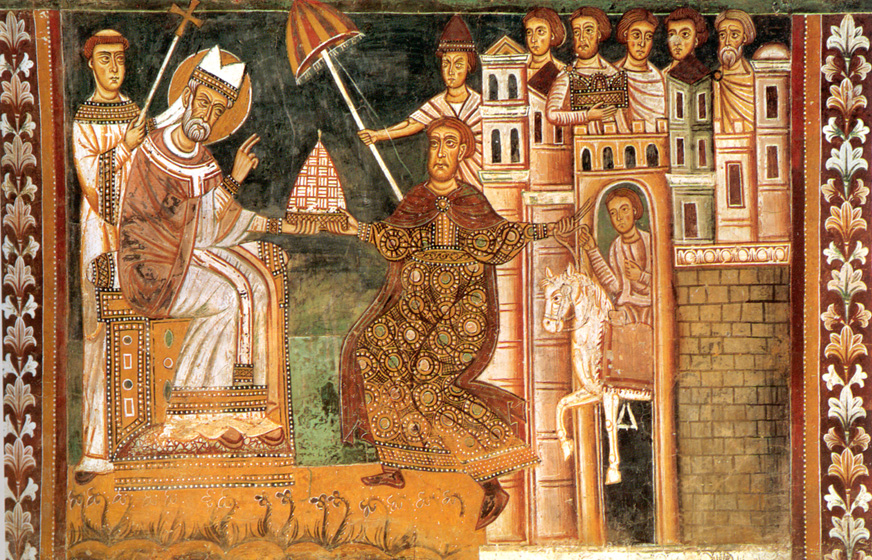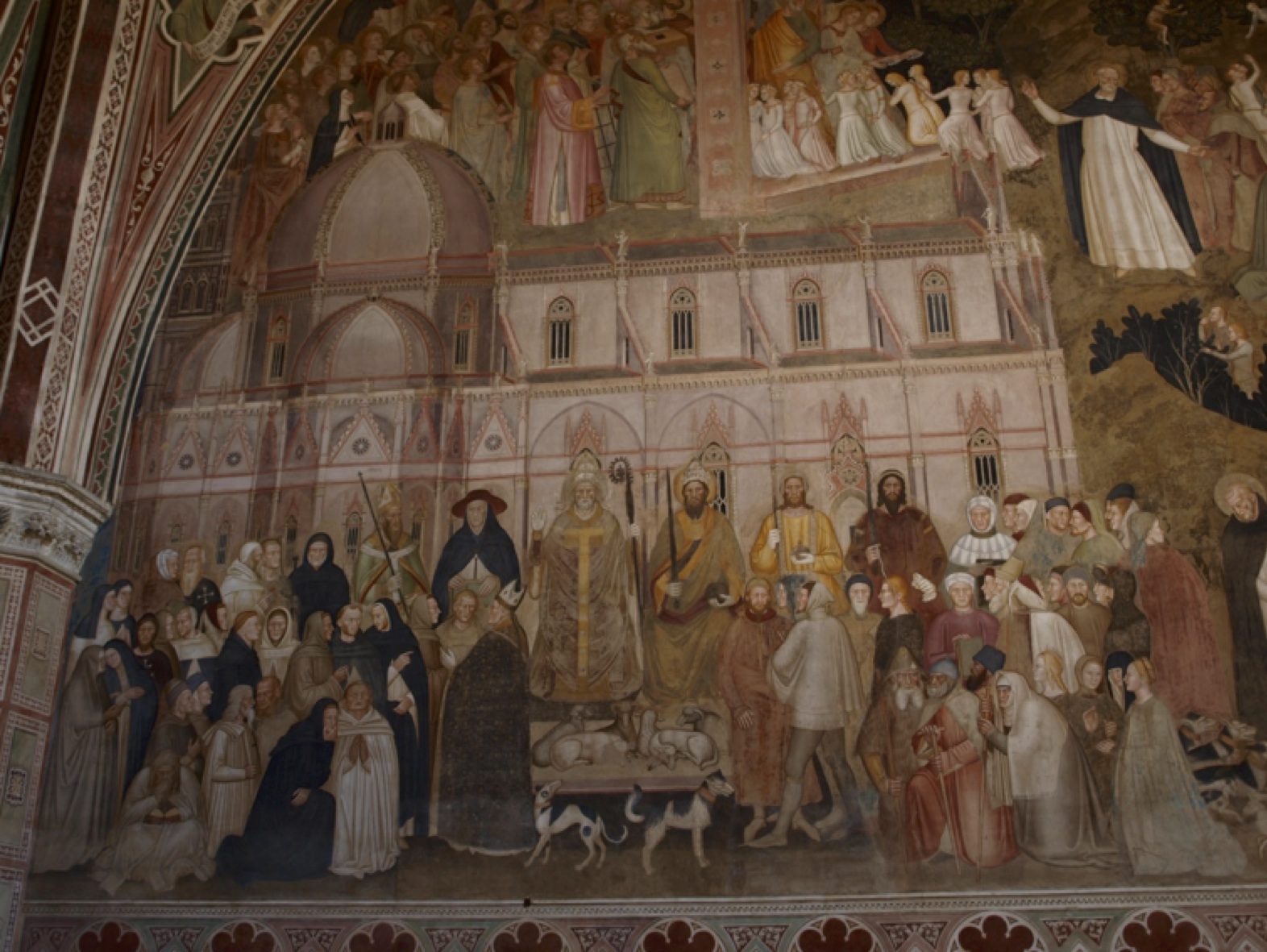4. The Western Christian world
The fall of the Western Roman Empire in 476 gave way to many kingdoms, creating a political (and cultural) landscape that was different from the East, where the Empire lasted until 1453. Christianity hence evolved separately in the East and the West. The ecumenical councils that brought together bishops of diverse origins and views, were discontinued, which reduced the possibilities of ongoing dialogue between them, as did fluency in Greek and Latin which went diminishing on either side, the linguistic divide being near current Bosnia. A Western (Latin) Christianity developed beside an Eastern (Greek) Christianity, while relations between them fluctuated over time and their divergence went on growing. This page is devoted to Western Christianity, the next to Eastern Christianity. .
The Donation of Constantine.
The Donation of Constantine ranks among the most famous forgeries. It was written in the 8th century, at a time when the papacy sought to justify its political ambitions. The text, believed genuine, was included in the Decretum Gratiani (Decree of Gratian), a compilation and ordering of canon law (Church law) which was promulgated in 1140. It provided the papacy with the legal foundation to assert itself opposite Western European sovereigns. The humanist Lorenzo Valla (1407-1457) exposed the document as a forgery.

13th-century anonymous fresco of Silvester and Constantine.
San Silvestro chapel at Santi Quattro Coronati (Rome).
Retrieved from http://commons.wikimedia.org/wiki/File:Sylvester_I_and_Constantine.jpg
The Donation of Constantine.
“And we ordain and decree that he shall have the supremacy as well over the four chief seats Antioch, Alexandria, Constantinople and Jerusalem, as also over all the churches of God in the -whole world […]. In imitation of our own power, in order that for that cause the supreme pontificate may not deteriorate, but may rather be adorned with power and glory even more than is the dignity of an earthly rule: behold we-giving over to the oft-mentioned most blessed pontiff, our father Sylvester the universal pope, as well our palace, as has been said, as also the city of Rome and all the provinces, districts and cities of Italy or of the western regions; and relinquishing them, by our inviolable gift, to the power and sway of himself or the pontiffs his successors-do decree, by this our godlike charter and imperial constitution, that it shall be (so) arranged; and do concede that they (the palaces, provinces etc.) shall lawfully remain with the holy Roman church.
Wherefore we have perceived it to be fitting that our empire and the power of our kingdom should be transferred and changed to the regions of the East; and that, in the province of Byzantium, in a most fitting place, a city should be built in our name; and that our empire should there be established. For, where the supremacy of priests and the bead of the Christian religion has been established by a heavenly ruler, it is not just that there an earthly ruler should have jurisdiction.”
The Donation of Constantine. Trans. Ernest F. Henderson.
The Church Militant and the Church Triumphant.
The Basilica of Santa Maria Novella was built by the Dominicans in 1246; an adjoining convent was added later. The Spanish Chapel is the former chapter house of the monastery, built between 1343 and 1345. It was decorated by Andrea di Bonaiuto da Firenze and his assistants between 1365 and 1367. The large fresco on the right wall represents the “Active and Triumphant” Church. The exhibit displays the left side of the fresco.

The Church Militant and the Church Triumphant.
Fresco by Andrea di Bonaiuto da Firenze, Chapel of the Spanish, Santa Maria Novella (Florence) (1365-1367).
Photo: Anna Van den Kerchove.
Vigilantia universalis
The decisions of the Roman Council of 1059 are a cornerstone of the Gregorian reform. They were made at a time when the papacy sought to challenge the hold of secular powers, and to restore the moral rectitude of the clergy. The document does not directly report on the decisions of the Council: it is a letter addressed by Pope Nicolas II (r. 1058-1061) to the entire Christian community, which publicized the Council's decisions. The major themes of the Gregorian reform are discussed in the excerpts.
“By watchfulness over the government of the universal Church we owe to all men constant care; and we also provide for your salvation. We desire therefore to notify you of all that was canonically done in the recent synod at Rome of a hundred and thirteen bishops, under our unworthy presidency; because, for your salvation we expect you to be executors thereof and we command your obedience thereto by our apostolic authority.
1. First of all, in the sight of God, it was ordained that the election of the Roman pontiff shall rest with the Cardinal-bishops lest, if anyone, without their unanimous and canonical election, as aforesaid and then without the consent of the religious clergy and laity following, should be enthroned, we should have a pope who is not apostolic but an apostate […].
3. No one shall hear the Mass of a presbyter whom he knows for certain to have a concubine or a woman-companion. Wherefore the synod itself ordained this statute under pain of excommunication, saying: “Whosoever, whether priest, deacon or sub-deacon, in accordance with the decree of our predecessor St. Leo [IX] of blessed memory on the chastity of clerks, openly takes a concubine or refuses to leave her, we, on behalf of Almighty God and with the authority of blessed Peter and Paul, by this ordinance, entirely forbid to sing Mass, or to read either the Gospel or the Epistle at Mass, or to remain at divine service side by side with those who obey the said decree, or to have a stipend from the church.”
4. And we ordain that those of the aforesaid Orders who, in obedience to our predecessor, keep chastity in the churches to which they have been ordained, as becomes religious clerks, shall eat and sleep and share in common whatever is assigned to them by the church; and we require and command that they shall above all things be zealous to live the apostolic, i.e. the common, life […].
6. No clerk or presbyter shall obtain a church from the laity whether by grant or payment […].
9. No one shall be ordained or promoted to any ecclesiastical function simoniacally.
10. No cleric of any Order shall be judged, or put out of his church by laymen […].
13. No layman shall be suddenly promoted to any ecclesiastical rank, except he first puts away his secular dress, and receives approval after living day by day in the company of clerks.”
Vigilantia universalis. Trans. B. J. Kidd, Documents Illustrative of the History of the Church, vol. 3.






